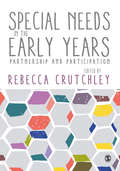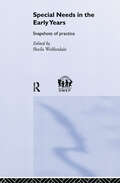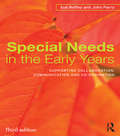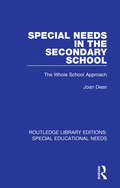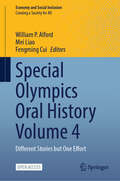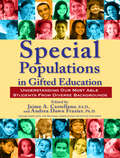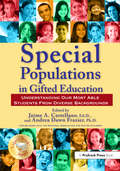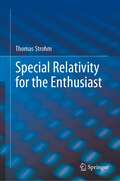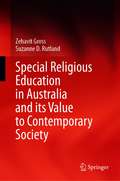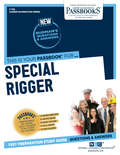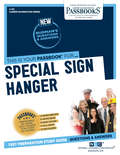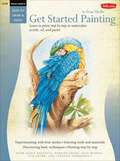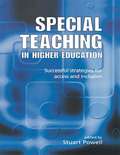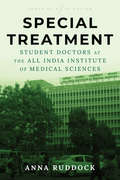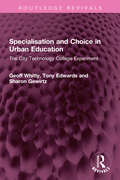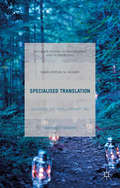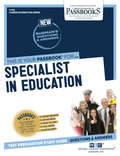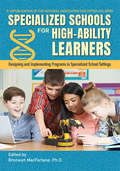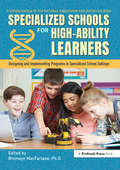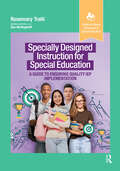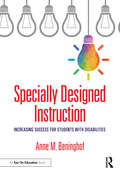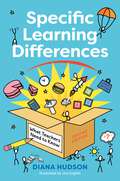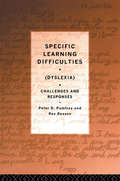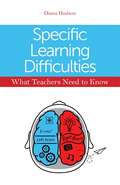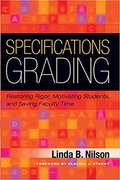- Table View
- List View
Special Needs in the Early Years: Partnership and Participation
by Rebecca CrutchleyFully up to date with the SEND Code of Practice this book explores all the key contemporary issues relevant to supporting children with special needs in an early years context. Combining theory with practice, it demonstrates how to ensure children’s individual needs are at the heart of early years provision. Key topics covered include: The history and current climate of SEN provision Working with Parents Models of special needs provision Leadership and inclusion Professional ethics Multi-agency working Early intervention International perspectives This core textbook is an essential read for early years students at all levels, and early years practitioners who wish to gain a greater understanding of the core issues affecting special needs provision.
Special Needs in the Early Years: Snapshots of Practice
by Sheila WolfendaleThis book celebrates good practice in the area of early years and special needs by bringing together authors who are either practitioners or researchers, from a range of different and diverse early years settings including nurseries and units providing special provision. They describe their work with young children who have different and distinctive special needs and disabilities.
Special Needs in the Early Years: Supporting collaboration, communication and co-ordination
by Sue Roffey John ParryThis highly popular and accessible text contains a wealth of information about how early years staff can work effectively with professionals and parents to help identify and meet a range of special educational needs.? This book aims to explore the most effective ways of supporting the child and implementing that support across the child’s day to day life. Now in its third edition Special Needs in the Early Years is fully updated to reflect current policy, and topics covered include: Early identification Effective communication with parents and carers An exploration of the legal context??????? How to implement joint planning for identified needs A consideration of the issues affecting collaboration With case-studies, checklists, suggestions for good practice and cartoons to illustrate and enrich the text throughout, this book is structured to be easily accessible and invaluable for those who are in training to work in the early years sector. It will also be of interest to students on foundation and undergraduate students on Early Childhood Education and childcare courses as well as more experienced practitioners.
Special Needs in the Secondary School: The Whole School Approach (Routledge Library Editions: Special Educational Needs #15)
by Joan DeanFirst published in 1989. The 1984 Act and the Warnock Report urged greater integration of pupils with special needs into ordinary schools. This book examines how schools cope with a wide variety of special needs – ranging from emotional and behavioural problems to physical disabilities and including the problem faced by gifted children – and assesses how successful the integration of children with special needs can be for both teachers and pupils. The author recommends the whole school approach where heads, form teachers, subject teachers, the special needs departments and parents work together in making the curriculum as accessible to as many students as possible. The whole school approach enables the fullest participation of all the children in the life of the school whatever their special needs. This book provides an extremely clear-sighted and positive analysis of integration and will be invaluable to all heads and teachers teaching, remediating or counselling children with special needs.
Special Olympics Oral History Volume 4: Different Stories but One Effort (Economy and Social Inclusion)
by William P. Alford Mei Liao Fengming CuiThis open access book commemorates the 50th anniversary of the Special Olympics (1968-2018). This is the fourth volume of the first oral history about people with intellectual disabilities in the world and the first oral history of persons with disabilities in China. This book also includes stories from teachers, coaches, school principals, parent leaders, coworkers, and volunteers. They share their personal views on people with intellectual disabilities. The book also includes observations and records of what people with intellectual disabilities and others do on a certain day. It uses sociology and oral history to give an objective, neutral account of the lives of people with intellectual disabilities in China. It helps readers understand how the Special Olympics movement, public policies, social environment, and self-cognition affect people with intellectual disabilities.
Special Populations in Gifted Education: Understanding Our Most Able Students From Diverse Backgrounds
by Jaime Castellano Andrea Dawn Fraziereducating children from diverse backgrounds
Special Populations in Gifted Education: Understanding Our Most Able Students From Diverse Backgrounds
by Andrea Dawn Frazier Jaime A. CastellanoA gifted education Legacy Award winner, Special Populations in Gifted Education: Understanding Our Most Able Students From Diverse Backgrounds brings together the leading experts in the field, who combine both knowledge of and leadership experience with gifted students from diverse backgrounds. Public schools are as diverse as ever, and as a result, historically underrepresented students need to be included in gifted education programs that serve our most able students. This edited book helps to raise the awareness level and knowledge base of all educators, particularly teachers of the gifted, who work with a kaleidoscope of special populations in gifted education.Chapters in this volume focus on topics such as gifted education in rural environments, highly gifted learners, twice-exceptional children, gifted females, gifted and talented students on the autism spectrum, English language learners, underachievement, and students from culturally or linguistically diverse backgrounds. Special Populations in Gifted Education is a must-have for educators working with students from diverse backgrounds.
Special Relativity for the Enthusiast
by Thomas StrohmThis textbook introduces special relativity with a focus on a profound understanding of the physics behind the theory. The main part of the book is targeted to undergraduates, for physics education, for undergraduate students in natural sciences in general, and even to interested laypersons. To serve these target groups, the book uses only basic mathematics and, in contrast to many other introductions to special relativity, the book is based on a pedagogical approach that relies on geometry and space-time diagrams to make the surprising predictions of the theory particularly clear. Special relativity is a geometric theory, and space-time diagrams are an efficient and easily understandable way to comprehend its implications. The textbook, however, is also suitable for advanced students and enthusiasts that already learned the basics of the special theory of relativity and want to know more. Special digression sections provide plenty of interesting material. Carefully selected problems with solutions and in-depth explanations for all key experiments help deepen the knowledge.
Special Religious Education in Australia and its Value to Contemporary Society
by Zehavit Gross Suzanne D. RutlandThis book explores the advantages of and challenges concerning Special Religious Education (SRE) in multicultural Australia and argues for the need for General Religious Education (GRE) as well. Through the lens of the most recent scholarship, and drawing on an in-depth qualitative study and specific case studies, the book examines the current debate on the role of religious education within government schools. It addresses key concepts of values education, spirituality, health and wellbeing, and cultural and religious identity. It analyses why it is important to retain SRE, together with GRE, as government policy. It explores highly relevant, controversial and contested issues regarding SRE, including the 30% of Australia’s population who declare themselves as having “no religion”, and brings fresh insights to the table. While secularization has increased in both the national and international spheres, there has also been an increase in fundamentalism within religious beliefs. Events such as the September 11 terror attacks and the more recent mass shootings by white supremacists and eco-fascists in Christchurch, New Zealand, and Pittsburgh and San Diego in the USA are reminders that religion is still a major actor in the twenty-first century. This poses new challenges for the relationship between church and state, and demonstrates the need to revisit the role of religious education within government schools. While the importance of GRE is generally acknowledged, SRE has increasingly come under attack by some researchers and teacher and parent bodies as being inappropriate and contradictory to the values of the postmodern world. On the other hand, the key stakeholders from all the faith traditions in Australia wish to retain the SRE classes in government schools. The book addresses this burning issue, and shows that it is relevant not only for Australia but also globally.
Special Rigger: Passbooks Study Guide (Career Examination Series)
by National Learning CorporationThe Special Rigger Passbook® prepares you for your test by allowing you to take practice exams in the subjects you need to study. It provides hundreds of questions and answers in the areas that will likely be covered on your upcoming exam.
Special Sign Hanger: Passbooks Study Guide (Career Examination Series)
by National Learning CorporationThe Special Sign Hanger Passbook® prepares you for your test by allowing you to take practice exams in the subjects you need to study. It provides hundreds of questions and answers in the areas that will likely be covered on your upcoming exam.
Special Subjects: In Four Media (How to Draw & Paint)
by Marla Baggetta Marilyn Grame Geri Medway Tom SwimmLearn how to paint in four different media! Taking the first steps to learn how to paint can be a challenge, especially when beginning artists are unsure which medium best suits them. With this book, aspiring artists will discover the qualities and benefits of four painting media-acrylic, oil, pastel, and watercolor-making it easier for them to begin their artistic journey. After an in-depth introduction to the tools and materials needed for each medium, five accomplished artists guide readers step by step through the creation of their own works of art.
Special Teaching in Higher Education: Successful Strategies for Access and Inclusion
by Stuart PowellCovering the Special Educational Needs and Disability Act (SENDA), this book addresses the learning needs of impaired and disabled students. It suggests effective responses for those designing and delivering the curriculum and discusses flexible teaching strategies.An essential purchase for any education professionals wanting to implement best practice when catering for those with particular needs - whether lecturers, course developers, course leaders or learning and teaching interest groups.
Special Treatment: Student Doctors at the All India Institute of Medical Sciences (South Asia in Motion)
by Anna RuddockThe All India Institute of Medical Sciences (AIIMS) is iconic in the landscape of Indian healthcare. Established in the early years of independence, this enormous public teaching hospital rapidly gained fame for the high-quality treatment it offered at a nominal cost; at present, an average of ten thousand patients pass through the outpatient department each day. With its notorious medical program acceptance rate of less than 0.01%, AIIMS also sits at the apex of Indian medical education. To be trained as a doctor here is to be considered the best. In what way does this enduring reputation of excellence shape the institution's ethos? How does elite medical education sustain India's social hierarchies and the health inequalities entrenched within? In the first-ever ethnography of AIIMS, Anna Ruddock considers prestige as a byproduct of norms attached to ambition, aspiration, caste, and class in modern India, and illustrates how the institution's reputation affects its students' present experiences and future career choices. Ruddock untangles the threads of intellectual exceptionalism, social and power stratification, and health inequality that are woven into the health care taught and provided at AIIMS, asking what is lost when medicine is used not as a social equalizer but as a means to cultivate and maintain prestige.
Specialisation and Choice in Urban Education: The City Technology College Experiment (Routledge Revivals)
by Geoff Whitty Tony Edwards Sharon GewirtzFirst published in 1993, Specialisation and Choice in Urban Education explores how city technology colleges (CTC) have managed the task of selecting intakes representatives of their catchment areas and explore their impact on local schools. From their announcements in 1986, CTC have been presented both as a new choice of school for the inner city and as pointing the way to a more diversified education system. This account of their development uses interviews with key architects of the initiative to identify more clearly the objectives CTCs were designed to serve. It then draws on interviews and observation in CTCs themselves to discover how far these schools are becoming centres of innovation in school management, curriculum and approaches to teaching and learning. Throughout, the CTC policy is considered in the context of Government’s broader political project to challenge ‘welfarism’ and to encourage entrepreneurship, competition, and choice. This book is an essential read for scholars and researchers of education policy, sociology of education, and education in general.
Specialised Translation: Shedding the 'Non-Literary' Tag (Palgrave Studies in Translating and Interpreting)
by M. RogersThis book shifts the common perception of specialised or 'LSP' translation as necessarily banal and straightforward towards a more realistic understanding of it as a complex and multilayered phenomenon which belies its standard negative binary definition as 'non-literary'.
Specialist in Education: Passbooks Study Guide (Career Examination Series)
by National Learning CorporationThe Specialist in Education Passbook® prepares you for your test by allowing you to take practice exams in the subjects you need to study. It provides hundreds of questions and answers in the areas that will likely be covered on your upcoming exam.
Specialized Schools for High-Ability Learners: Designing and Implementing Programs in Specialized School Settings
by Bronwyn MacFarlaneSpecialized Schools for High-Ability Learners focuses on educational programming offered in nontraditional, publicly approved, and private settings, with important details about how to serve high-ability learners in specialized schools and deliver schoolwide educational change. Each chapter offers a differentiated resource for educators who are interested in designing and implementing programs in specialized school settings by providing a discussion of the critical components for inclusion in a carefully planned, coherent, and quality-minded K-12 curricular sequence. This book delivers a comprehensive discussion with recommendations for the learning experiences of high-talent students in specialized schools and alternatively approved educational programs. Through relevant research and practical applications, this compendium will help in developing high levels of talent among the next generation of competent critical thinkers.
Specialized Schools for High-Ability Learners: Designing and Implementing Programs in Specialized School Settings
by Bronwyn MacFarlaneSpecialized Schools for High-Ability Learners focuses on educational programming offered in nontraditional, publicly approved, and private settings, with important details about how to serve high-ability learners in specialized schools and deliver schoolwide educational change. Each chapter offers a differentiated resource for educators who are interested in designing and implementing programs in specialized school settings by providing a discussion of the critical components for inclusion in a carefully planned, coherent, and quality-minded K-12 curricular sequence. This book delivers a comprehensive discussion with recommendations for the learning experiences of high-talent students in specialized schools and alternatively approved educational programs. Through relevant research and practical applications, this compendium will help in developing high levels of talent among the next generation of competent critical thinkers.
Specially Designed Instruction for Special Education: A Guide to Ensuring Quality IEP Implementation (Evidence-Based Instruction in Special Education)
by Rosemary TralliA new resource for teacher preparatory programs at institutes of higher education and school-based professional development, Specially Designed Instruction for Special Education: A Guide to Ensuring Quality IEP Implementation offers a detailed account of the legal requirements and evidence-based practices for educators to afford quality specialized instruction to eligible students.The latest entry in SLACK’s Evidence-Based Instruction in Special Education series, Specially Designed Instruction for Special Education provides educators with practical tools to define, plan, implement, and assess educational conditions and practices. After reading this text, special education teacher candidates and educators will possess the knowledge and skills to ensure student success through specially designed instruction, align interventions with student strengths and needs, and engage in collaborations to develop and implement quality Individualized Education Programs.What’s included in Specially Designed Instruction for Special Education: Individuals with Disabilities Education Act connections with references to federal regulations and relevant court cases Evidence-based practices and tools that support specialized instruction Key takeaways that summarize concepts and practices associated with the chapter content Included with the text are online supplemental materials for faculty use in the classroom.Specially Designed Instruction for Special Education provides readers with a comprehensive understanding of the composition and conditions of specialized instruction and the tools to ensure their adherence to the legal and programming components of specialized instruction.
Specially Designed Instruction: Increasing Success for Students with Disabilities
by Anne M. BeninghofIn engaging, accessible chapters, expert teacher and author Anne M. Beninghof lays out a road map for providing specially designed instruction in any classroom. This book equips you with the answers to the most frequently asked questions around incorporating special education services into the general classroom – What is SDI? Who is responsible? How do we make it happen? Focused on creating an effective planning process that you and your team can follow to develop specially designed instruction, this toolkit includes dozens of practical examples, worksheets, and prep tools to ensure readers walk away with a thorough understanding and ready-to-use ideas. Whether you have years of experience working with students with disabilities or are new to the profession, this critical guide provides effective strategies for every classroom.
Specific Learning Differences, What Teachers Need to Know (Second Edition): Embracing Neurodiversity in the Classroom
by Diana HudsonThe updated, straight-talking and accessible guide is ideal for teachers, teaching assistants, SENCOs, senior leadership and even home schooling parents who want to know more about supporting students with Learning Differences.Highlighting some of the more commonly encountered Specific Learning Differences (SpLD's), expert Diana Hudson concisely describes the signs of those that are most commonly encountered in the classroom. Covering: dyslexia, dyspraxia, dyscalculia, dysgraphia, autism spectrum condition, ADHD, OCD and featuring brand new chapters on Pathological Demand Avoidance (PDA), Sensory Processing Disorder (SPD) and tics and Tourette Syndrome, this book covers all the information you need, whilst reminding us that all neurodivergent children are individuals and have different qualities.Diana provides an overview of each identity and evaluates how you may need to adapt your levels of support in the classroom - as well as practical suggestions for modifying teaching materials and methods to make learning enjoyable, effective and accessible for all students. There are also dedicated chapters on helping students with SpLD's to improve their organisation and develop effective revision skills and exam techniques.
Specific Learning Difficulties (Dyslexia): Challenges and Responses
by Rea Reason Peter D. PumfreyDrawing on the work of eleven experienced educational psychologists, this book presents a variety of approaches to prevention, identification and intervention and makes practical recommendations for future progress.
Specific Learning Difficulties - What Teachers Need to Know
by Diana Hudson Jon EnglishThis book clearly explains what Specific Learning Difficulties (SpLD) are, and describes the symptoms of conditions most commonly encountered in the mainstream classroom: dyslexia, dyspraxia, dyscalculia, dysgraphia, Autism Spectrum Disorder, ADHD, and OCD. The author provides an overview of the strengths and weaknesses commonly associated with each of these conditions, as well as practical suggestions for modifying teaching materials and methods to make learning enjoyable, effective and accessible for students. There are also dedicated chapters on helping students with SpLDs to develop effective revision skills and exam techniques. This straight-talking and accessible guide is ideal for teachers, teaching assistants, and those in school management who want to know more about supporting students with Specific Learning Difficulties.
Specifications Grading: Restoring Rigor, Motivating Students, and Saving Faculty Time
by Linda B. Nilson Claudia J. StannyIn her latest book Linda Nilson puts forward an innovative but practical and tested approach to grading that can demonstrably raise academic standards, motivate students, tie their achievement of learning outcomes to their course grades, save faculty time and stress, and provide the reliable gauge of student learning that the public and employers are looking for. <p><p> She argues that the grading system most commonly in use now is unwieldy, imprecise and unnecessarily complex, involving too many rating levels for too many individual assignments and tests, and based on a hairsplitting point structure that obscures the underlying criteria and encourages students to challenge their grades. <p><p> This new specifications grading paradigm restructures assessments to streamline the grading process and greatly reduce grading time, empower students to choose the level of attainment they want to achieve, reduce antagonism between the evaluator and the evaluated, and increase student receptivity to meaningful feedback, thus facilitating the learning process – all while upholding rigor. In addition, specs grading increases students’ motivation to do well by making expectations clear, lowering their stress and giving them agency in determining their course goals. <p><p> Among the unique characteristics of the schema, all of which simplify faculty decision making, are the elimination of partial credit, the reliance on a one-level grading rubric and the “bundling” of assignments and tests around learning outcomes. Successfully completing more challenging bundles (or modules) earns a student a higher course grade. Specs grading works equally well in small and large class settings and encourages “authentic assessment.” Used consistently over time, it can restore credibility to grades by demonstrating and making transparent to all stakeholders the learning outcomes that students achieve. <p><p> This book features many examples of courses that faculty have adapted to spec grading and lays out the surprisingly simple transition process. It is intended for all members of higher education who teach, whatever the discipline and regardless of rank, as well as those who oversee, train, and advise those who teach.
